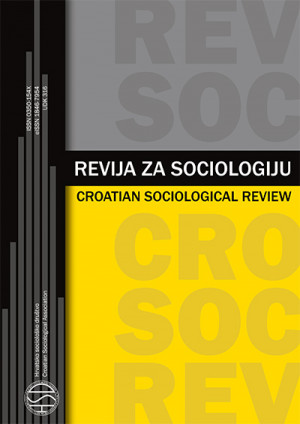Odnos religioznosti, stavova o nacionalizmu i o rodnim ulogama s postmaterijalističkim vrijednostima splitskih srednjoškolaca
Relationships between Post-materialistic Values and Religiousness, Attitudes towards Nationalism, and Attitudes towards Gender Roles among High School Students in the City of Split
Author(s): Boris Milavić, Vesna Trut, Petra SinovčićSubject(s): Gender Studies, Higher Education , Nationalism Studies, Sociology of Education
Published by: Hrvatsko sociološko društvo
Keywords: Inglehart's modernisation theory; gender roles; nationalism; postmaterialism; religiousness; high school students;
Summary/Abstract: According to Inglehart's modernisation theory, socio-economic growth leads to changes in values. Following a longer period of economic growth, a gradual change from materialistic to post-materialistic values is established. The main goal of this study, which is based on Inglehart's theory, was to assess the relationship between post-materialistic values on one side and religiousness, attitudes towards nationalism, and attitudes towards gender roles on the other among high school students in the city of Split. The research was conducted on a convenience sample of 427 high school students from Split (there were 269 female students and 158 male students) with the average age of 17 years. The results indicated that the students from the sample had mixed materialistic and post-materialistic values. Statistically significant differences were found between male and female students in all measured variables. For this reason, analyses were conducted separately by gender. Using multiple regression analysis, it was established that the model with post-materialistic values as the outcome was statistically significant regardless of gender. Discriminative analysis additionally showed that the measured attitudes discriminated groups of students with different levels of post-materialistic values (most prominently, attitudes towards gender roles and religiousness among female students, and attitudes towards nationalism and gender roles among male students). The main finding of the study was that of a difference between male and female students in terms of measured religiousness and two sets of attitudes, as well as gender differences in the relationship between the measured religiousness and the measured attitudes on one side and post-materialistic values on the other. Higher post-materialistic values were associated with lower religiousness among female students and lower acceptance of nationalism among male students.
Journal: Revija za sociologiju
- Issue Year: 46/2016
- Issue No: 1
- Page Range: 5-31
- Page Count: 27
- Language: Croatian

